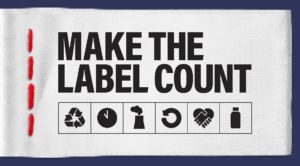Product environmental footprint (PEF): Proposed EU labelling might distort sustainability claims
As part of its work around circular economy and consumer protection, the EU is planning to launch a sustainability label for clothing. While the initiative “Make the Label Count” welcomes the aims of this label, it criticises the current methodology behind this proposed label. The Product Environmental Footprint (PEF) focusses on measuring and communicating harmful environmental impacts. However, there are critical environmental impacts that aren’t included in the methodology that could significantly distort the credibility and truthfulness of the EU’s environmental impact ratings of clothing and footwear products.

![]() 1. Microplastic pollution: Microplastic pollution from synthetic materials is not included in the current environmental impacts of the PEF methodology and therefore does not carry any negative scoring despite increasing scientific evidence of the harmful impact to both planetary and human health.
1. Microplastic pollution: Microplastic pollution from synthetic materials is not included in the current environmental impacts of the PEF methodology and therefore does not carry any negative scoring despite increasing scientific evidence of the harmful impact to both planetary and human health.
![]() 2. Environmental impact of fossils: The full environmental impacts of the formation of crude oil – a base material for producing synthetic fibres – are not accounted for in the PEF methodology. By contrast, all the impacts of forming natural fibres are fully taken into account, including the greenhouse gas emissions and land and water use.
2. Environmental impact of fossils: The full environmental impacts of the formation of crude oil – a base material for producing synthetic fibres – are not accounted for in the PEF methodology. By contrast, all the impacts of forming natural fibres are fully taken into account, including the greenhouse gas emissions and land and water use.
![]() 3. Renewability, recyclability & biodegradability: PEF does not offer any positive scoring for biodegradable fibres, while nonbiodegradable fibres are not penalised for continually adding solid waste to the world’s landfills and further releasing microplastics to the soil, oceans and air. This limitation could be addressed by including parameters that account for biological circularity in the overall score.
3. Renewability, recyclability & biodegradability: PEF does not offer any positive scoring for biodegradable fibres, while nonbiodegradable fibres are not penalised for continually adding solid waste to the world’s landfills and further releasing microplastics to the soil, oceans and air. This limitation could be addressed by including parameters that account for biological circularity in the overall score.
![]() 4. Durability: The European Environmental Agency (EEA) recognises that natural fibres, such as wool, have better durability and lower impacts in the use phase and end-of-life, compared to synthetic fibres.
4. Durability: The European Environmental Agency (EEA) recognises that natural fibres, such as wool, have better durability and lower impacts in the use phase and end-of-life, compared to synthetic fibres.
 5. Production practices: Under PEF, the impacts of production practices are modelled without considering how they are derived, meaning the use of renewable resources and sustainable management practices aren’t accounted for, or incentivised.
5. Production practices: Under PEF, the impacts of production practices are modelled without considering how they are derived, meaning the use of renewable resources and sustainable management practices aren’t accounted for, or incentivised.
 6. Social impacts: The socio-economic impact of fibre production and textile manufacturing is not considered in the European Commission current labelling proposal. Growing natural fibres provides an income for rural, remote, and poor communities which is inseparable from their sustainability.
6. Social impacts: The socio-economic impact of fibre production and textile manufacturing is not considered in the European Commission current labelling proposal. Growing natural fibres provides an income for rural, remote, and poor communities which is inseparable from their sustainability.
More information: www.makethelabelcount.org

